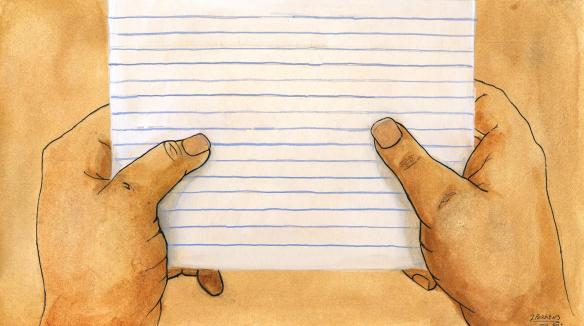Adventures of an Amateur Writer
Yes, I remember being a young writer. I think my eighth grade English teacher, Mr. Hershey, was encouraging me, but at the time, it felt more like I was being tolerated. Mr. Hershey was a sweet, sweet man. When I told him that the title of my poetry notebook was “Evangeline and Other Poems I Hate,” he merely gave a grimace-smile, and said, “Oh, you don’t really mean that.” I did.
But we were supposed to include some original work, and I wrote my first doggerel, beginning a distinguished career in that genre that may have peaked but has not ended. It was called “The Ballad of Horace and Bill.” It described two minors experimenting with alcohol and the lamentable results. The only line I can remember is, “Bill started out with a bottle of beer, and Horace with some stronger stuff.” Stronger stuff indeed, and I was fairly launched.
Ninth grade saw my first attempt at parody. Miss DeJong was so tickled by my burlesque of Joyce Kilmer’s “Trees” that she read it to the class. She played the laugh lines for all they were worth, but they fell flat. What do you expect from a class where Bob Waldman stabbed me in the back with a hypodermic needle? But folks, Miss DeJong liked my poem, and nothing else mattered. I had immense respect for the exotically beautiful Verna DeJong, who drove a Jaguar.
Some creativity can’t get the required oxygen in the confines of an educational institution, so I was testing my wings with fiction in less-structured surroundings, and learning valuable lessons as a result. My friend Van and I were conversant with most of Ian Fleming’s canon and devotees of NBC’s “The Man from U.N.C.L.E.,” so we wrote spy stories with derivative plots and humorless gags and ourselves as the heroes. Reading my materials some months later, I was appalled and grieved at my incompetence. Despite Van’s earnest pleadings (which, I’m sorry, Van, did not reflect well on you), I burned my collected works in his backyard.
This began a too-long protracted, sobering ritual of mine: I would periodically return to my works of two or three years prior, and be embarrassed by my bad writing. Does that happen to everyone? Harper Lee, for instance? I sincerely hope not. No one deserves the torture I endured. Slowly, with the assistance of various inestimable authors, I reached a point, somewhere in the past few decades, where my scribbles no longer made me wish I could burn them in the Millers’ backyard.
Three paths to greatness developed. If you guessed minutes writing, inside-joke song parodies, and studies of Abraham Lincoln for general audiences, you clearly have detected the obscure hints sprinkled in the foregoing. I first wrote minutes as the secretary of Bender Hall men’s dormitory. Who would want such a job? I was part of an abortive political takeover attempt. To back out would have been to acknowledge the defeat our overall ticket had suffered. But the thought of writing something that people would reflexively find tedious was abhorrent to me. I resolved to entertain. I was perhaps not consistently entertaining, but my efforts did not go unnoticed. This pleased me. Amateur or otherwise, writers who don’t care to be noticed don’t call themselves writers.
I poked fun at Little Donnie Ford for saying “orientated” instead of “oriented.” I received a reprimand for characterizing an all-night bowling mixer as “all night activities.” I learned to operate office machinery. But after college, without a mimeograph, I stagnated. I promised Professor Cheng that I would write something every day, but I frequently broke that promise on the marble-hard hurdle of my dull stupidity. I knew nothing of life and would not for some time.
So let’s skip over most of the self-pity and enter into the period when I became a county department head. Department head meetings were regularly scheduled but unofficial, so I volunteered to write the minutes, wagering that creativity would be accepted in lieu of strict accuracy. I was right, and encouragement emboldened me to irreverence. I purposed to ride that sway backed nag as far as it would take me, and it is ambling still. I found that other organizations were similarly disposed. When Bruce Estabrook told me at a KUNI Friends board meeting that “last month’s minutes weren’t funny enough,” I both realized my success and understood my responsibility.
My statewide associations held various conferences, which needed a leavening of relaxation. It was here that I polished my song-parody skills, which had gestated at political fundraisers. (“Hey There, Georgie Boy,” “I’m Georgie Number Two I Am,” etc.) I was commissioned (or at least invited) to write a musical about elections. The idea was to incorporate re-lyricized songs with familiar refrains so the audience could sing along. My fellow election administrators enthusiastically roared such taglines as (to the tune of “Like a Rolling Stone”) You’re making people mad/You think that you’ve been had/You disenfranchised your dad/Just like a hanging chaaaad. Now, I want you to leave off groaning in disgust and think about the fact that The Capitol Steps make some serious coin singing rot like that.
There was no guarantee of a payoff for the years of instruction that these experiences afforded me, but one arrived anyhow. The Iowa State Association of Counties, the selfsame organization that tolerated my outrages against popular music, got me appointed to the Iowa Abraham Lincoln Bicentennial Commission, which decided in due course to research the personal connections that the Illinoisan Lincoln had to his neighboring state of Iowa. This led me to prepare a lecture, which led to articles in the ISAC monthly magazine, which led to an extended article in Iowa Heritage Illustrated, which led to more Lincoln studies, which led to more lectures and articles, which presumably led to an invitation to write a (non-Lincoln) book review in North American Review.
If this seems to you a lofty aerie for a somewhat silly goose, you and I are in much of an agreement. It is still my privilege to write Lincoln articles for the Iowa County magazine, but I also apply much of my talent to writing limericks for the amusement of other county officials in our state and national organizations. A compilation in book form has been suggested. I’m not kidding.
Grant Veeder is the County Auditor and Commissioner of Elections in Black Hawk County, Iowa. He is a graduate of Boone High School in Boone, Iowa, and holds degrees in English and history from the University of Northern Iowa. Grant appears in the Winter 2014 issue with "The Reluctant Rehabilitation of Big Bill Taft."
Justin Perkins is today's featured artist. He graduated from College for Creative Studies. A freelance illustrator and designer, he teaches art in Detriot. Justin's first illustration for North American Review appeared in issue 298.4.
Recommended
Nor’easter
Post-Op Appointment With My Father
Cedar Valley Youth Poet Laureate | Fall 2024 Workshop






